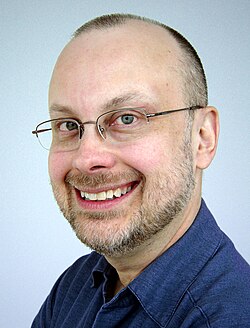Style and themes
Sawyer's work frequently explores the intersection between science and religion, with rationalism winning out over mysticism. [8] The most relevant novels in this regard are Far-Seer , The Terminal Experiment , Calculating God , and the three volumes of the Neanderthal Parallax (Hominids, Humans, and Hybrids), in addition to the short story "The Abdication of Pope Mary III" (originally published in Nature, July 6, 2000).
Sawyer often explores the notion of copied or uploaded human consciousness (or mind uploading)—most fully in his novel Mindscan, but also in Flashforward , Golden Fleece, The Terminal Experiment, "Identity Theft", "Biding Time", "Shed Skin", and The Downloaded.
His interest in consciousness studies [9] is also apparent in Wake, which deals with the spontaneous emergence of consciousness in the infrastructure of the World Wide Web. His interest in quantum physics, and especially quantum computing, informs the short stories "You See But You Do Not Observe" [10] (a pastiche of Sherlock Holmes ) and "Iterations," [11] in addition to the novels Factoring Humanity and Hominids.
SETI, the Search for Extraterrestrial Intelligence, plays a role in the plots of Golden Fleece, Factoring Humanity, Mindscan, Rollback, the novelette "Ineluctable," and the short stories "You See But You Do Not Observe" and "Flashes." Sawyer gives cosmology a thorough discussion in his far-future Starplex. [12] Real-life science institutions are often used as settings by Sawyer, including TRIUMF in End of an Era, CERN in Flashforward , the Royal Ontario Museum in Calculating God, the Sudbury Neutrino Observatory in Hominids and its sequels, the Arecibo Observatory in Rollback, the Canadian Light Source in Quantum Night, and the Los Alamos National Laboratory and the Institute for Advanced Study in The Oppenheimer Alternative .
Sawyer's prose has been described by Orson Scott Card as similar to that of Isaac Asimov in its clarity. [13]
SF/mystery crossovers
Sawyer has won both Canada's top SF award (the Prix Aurora Award) and its top mystery-fiction award (the Arthur Ellis Award) for his 1993 short story "Just Like Old Times". [14] Illegal Alien is a courtroom drama with an extraterrestrial defendant; Hominids puts one Neanderthal on trial by his peers for the apparent murder of another Neanderthal; Mindscan has the rights of uploaded consciousnesses explored in a Michigan probate court; and Golden Fleece, Fossil Hunter , The Terminal Experiment, Frameshift, Flashforward , and Red Planet Blues are all, in part, murder mysteries. Of Sawyer's shorter SF works, the novella Identity Theft and the short stories "Biding Time", "Flashes", "Iterations", "Shed Skin", "The Stanley Cup Caper", "You See But You Do Not Observe", "The Hand You're Dealt", and the aforementioned "Just Like Old Times" are all also crime or mystery fiction.
